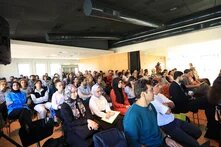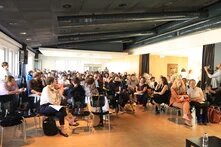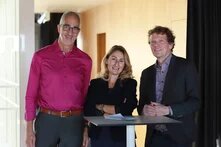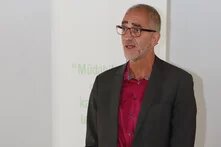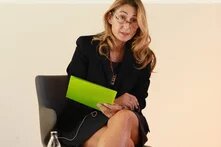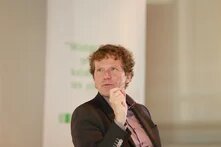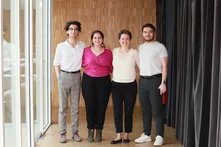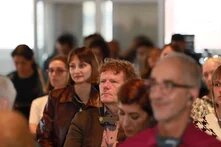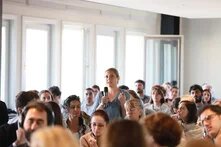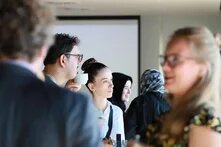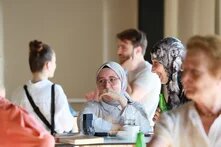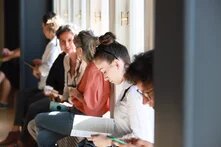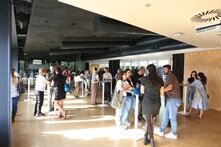
At the Heinrich Böll Stiftung Istanbul Office’s conference, sociologist and thinker Hartmut Rosa shared a future vision in which politics is formulized not through conflict but through “resonance” to build a better world together. According to him, modernity has failed to fulfill its past promises.

When the sky is covered with pitch-black clouds, where do we find the strength to imagine tomorrow? How can ideas that will build the future flourish in bleak and paralyzing political conditions? These were the questions the two-panel conference organized as part of the 30th-anniversary events of the Heinrich Böll Stiftung Istanbul Office sought to answer.
The keynote speaker of the conference, titled “Unlocking the Future: Pathways to a New Vision for Turkey” held at Salt Galata on October 11, 2024, was Prof. Dr. Hartmut Rosa, a sociologist and thinker from the University of Jena. He was accompanied by Assoc. Prof. Dr. Zeynep Savaşçın, a political philosopher from Galatasaray University, and Dr. Dawid Bartelt, Director of the Heinrich Böll Stiftung Istanbul Office.
In the conference's opening, Bartelt explained why we addressed this topic as part of the 30th-anniversary events.
“For many of you who are part of this story, these 30 years have been a constant struggle, a time of hope and despair, of joy and sadness, and above all of success and failure, of victory and defeat. I could see and hear those striving for democracy, the rule of law and tolerance see themselves surrounded by walls, and the walls seem to be moving, coming closer and closer, blocking paths, shrinking spaces. When they think about the future, they think about threats, narrow spaces, and darkness. It is the result of a systematic and deliberate “politics of fear” that paralyzes and above all kills the future. It is a form of violence that causes mental and emotional as well as physical damage. It is harmful both individually and collectively. However, we say that every future is unknown but shapeable, and in this sense open, and full of possibilities. It is time to rediscover and strengthen this openness as an intellectual and political attitude. Defeats also have positive potential, from the emotional to the epistemological. Turkish civil society is still active and diverse. It has its own power. It has a history of struggle, resistance and considerable progress to draw on as an emotional reservoir. This civil society has the potential - and the practice - of being a politically active public sphere, which, according to our keynote speaker and special guest Hartmut Rosa, is the precondition for realising resonance.”
Bartelt underlined that young generations have grown weary of this violent and polarizing form of politics and handed the floor to Dr. Rosa for the keynote speech and the first panel.
Being open to unpredictability
The title of the first panel was “Acceleration, alienation, and resonance: Suggestions for a societal practice towards an open future in difficult political contexts.”
According to Hartmut Rosa, with its rich history, geographical location, and social fabric, Turkey could serve as a remarkable example for understanding the direction of the world.
That is why, he explained, it is meaningful to talk about today’s stagnation and future perspectives in Turkey.
Here are some highlights from Rosa's presentation:
- We are convinced we are building something for the future generations, for our children. I think this was an essential part of modernity's promise, of building a better world for future generations. This better world was clearly had some material aspects like coming out of scarcity and poverty and ignorance. Also human rights and a democratic world where people want to live in. And somehow we have lost this vision.
- We do not just lose future, also lose the past in a certain sense. Because we thought for a long time all the past, that's enlightenment, democracy, liberalism, human rights, the values we stand for. It's freedom, it's this progress story. But now there's a kind of reinterpretation of this process going on where Europeans discover that our past was not just enlightenment and human rights. It was also colonialism, imperialism, repression, oppression, sexism and so on. So the future is always also connected to the past.
- And I think resonance clearly has a kind of historical connection, having a sense of where you come from, listening to your history. Resonance is engaging; in the democratic resonance, there is a dialogue about possible pasts, where we come from, what we could learn from it, what it tells, and as many pasts as you have, as many futures, there might be. Turkey is situated between east and west and north and south. That's the center of the World. This is a privileged place to think about where we want to go. What are the possible perspectives, what are possible futures and possible pasts and how do we get there?
- Society can be called modern when its mode of stabilization is dynamic. And that means it's not just dynamic, but it's increasingly dynamic. There's an escalatory logic, which means it systematically requires material growth, tech growth, technological acceleration and cultural innovation just to stay in the form it is.
- You can never say, that's enough, let's stay here. I assume most of you have the feeling you need to run faster every year just to stay where you are. There are two images that are very strong on this. One is the hamster in the wheel. But my favorite image is the downward escalator, the escalator which goes down. So as soon as you stand still, you're sliding backward.
- This logic of dynamic stabilization leads to a mode of aggression. We live in aggression towards nature, in aggression towards ourselves, and in aggression on a political level. People think of each other not as political opponents, but as enemies of mankind. The program of modernity created the monsters of uncontrollability. Because war is a monster of uncontrollability, as is the ecological disaster. And we have kind of created monsters of uncontrollability in the form of depression and burnout on the inside.
- It's wrong to think of people as kind of being naturally antagonistic. Politics is in the first place about shaping the society we live in. Struggle is in a conflict, is kind of natural in a certain sense. But republicanism means, I want to hear your different beliefs, your different views, your different conceptions. Then we engage in a kind of encounter that creates dialogue. It's not just about arguments.
- Democracy does not start with something we already share. It's the idea of a collective project. I have a different conception from you and from others about the future. So let's get together.
- There is the capacity to start anew, and this capacity to start a new mentality always is kind of coming out of a process of resonance, listening and responding, participating and being involved.
After Dr. Rosa, Zeynep Savaşçın from Galatasaray University took the floor during the panel section of the conference and emphasized the value of relationality that Rosa pointed out:
“Resonance theory is also a theory of the public sphere and democracy because it teaches us that the public sphere is not only a space for reason but also for emotions.”
In the second session of the panel, titled “We, the “Generation Z” in Turkey – are we a Generation W(all)? Our perspectives to create our future” young people spoke under the moderation of Yonca Verdioğlu, Program Coordinator at Heinrich Böll Stiftung Turkey.
Three young activists, who are also hbs scholars, Berfin Hanalp, Baran Örnek, and Nevzat Taşçı, shared their experiences, struggles, and expectations from their areas of activism.
They said that, like Rosa mentioned, they need to exist, be heard, and be involved. They explained the possibilities of involvement in a changing world. They even consoled the older generations in the face of the fear created by technology and social media.
The full conference is available on our YouTube channel.
Konferans: Türkiye üzerine yeni bir tasavvurun yolları | I: Zor koşullarda geleceği inşa edebilmek - Heinrich Böll Stiftung İstanbul Ofisi
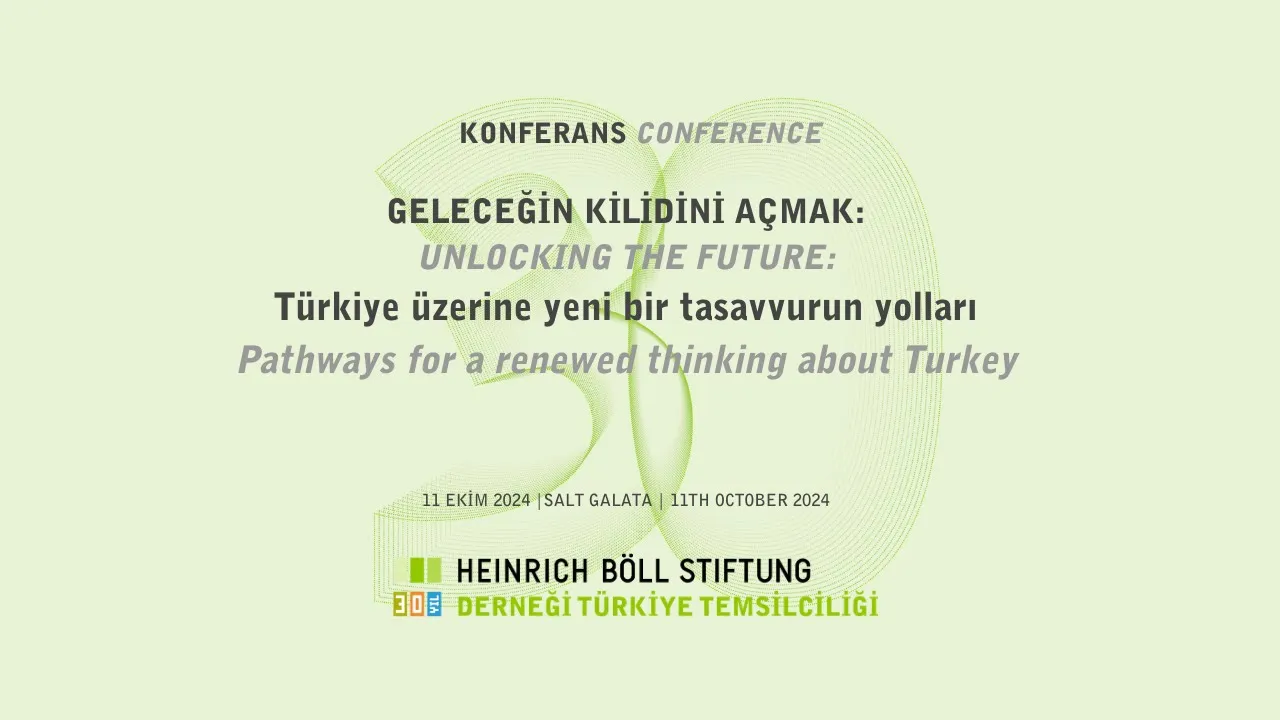 Watch on YouTube
Watch on YouTube
Konferans: Türkiye üzerine yeni bir tasavvurun yolları | II: Bizler ‘Z kuşağı’, duvara mı çarptık? - Heinrich Böll Stiftung İstanbul Ofisi
 Watch on YouTube
Watch on YouTube
